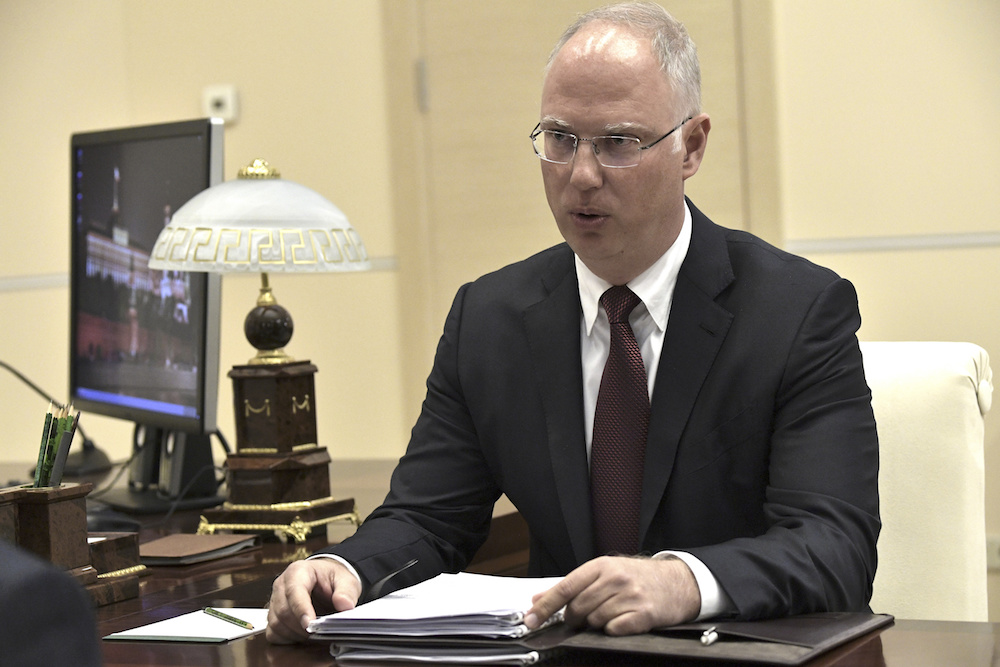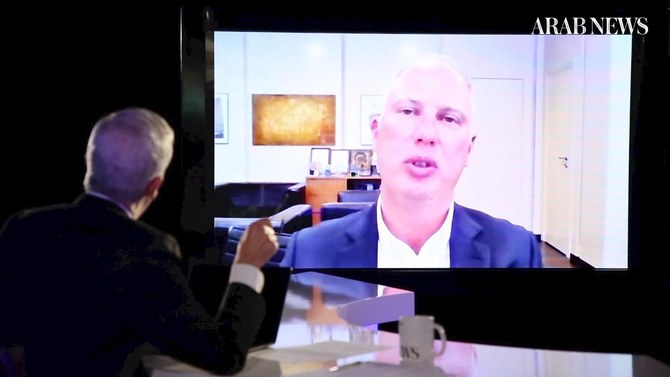DUBAI: Kirill Dmitriev, the chief executive of the Russian Direct Investment Fund (RDIF), was uncompromising. “We have without question the best vaccine in the world,” he told Arab News.
The vaccine, Sputnik V, which has been developed to counter the COVID-19 virus, has been the subject of much skepticism in Western media and by some medical experts, but Dmitriev is having none of that.
He thinks that skepticism — a campaign of “deliberate disinformation” — is the result of jealousy of Western pharma companies mixed with a dose of geopolitical rivalry, and is not justified by the science or the Sputnik V record so far.
“If you look at several key parameters such as safety, efficacy, logistics, length of shot, lack of allergies, lack of other significant consequences, Sputnik V is out there as the number one, the best vaccine in the world,” Dmitriev said.
Dmitriev, who is well known in the senior circles of power in Saudi Arabia through the investment and financial work of RDIF, was speaking on Frankly Speaking, the televised interview in which senior policymakers are questioned on their views about the most important issues of the day.
He said Sputnik V was steadily winning over the rest of the world to the benefits of its product, which uses a human adenovirus vector, in contrast to Western techniques.
Recently, Argentina authorized the vaccine and received its first supplies, and just last week Paraguay announced it too was going for the Russian product. Of course, the biggest roll-out has been in Russia itself, where 1.5 million people have taken the Sputnik V shots, including — as Dmitriev pointed out with great satisfaction — the Moscow correspondent of the New York Times, who was among the more scathing critics of Sputnik after was launched last summer.
Andrew Kramer, who had been highly critical of the science behind Sputnik V and the Russian government’s development of the first COVID-19 vaccine, finally conceded it was a “bona fide accomplishment for Russian scientists continuing a long and storied practice of vaccine development” — quite a climbdown for a correspondent of a newspaper not known to be charitable towards Russia.
Dmitriev also detects a change of tone among European countries who are now more willing to consider Sputnik V, as they experience problems getting sufficient doses of other vaccines. There have been talks between German and Russian leaders about co-operation on vaccine production, as well as France and other European countries.
Russia is seeking approval from European authorities, and is also in collaboration with Astra Zeneca of the UK on a product that combines vaccine techniques. “There is no question that the skeptics are out of arguments. We have one of the best vaccines and that is accepted by more and more countries every day,” he said.
Dmitriev predicted that the worst of the pandemic would be over by May in countries that had done “very massive, very fast vaccination.”
Although a financier and investment expert by background, Dmitriev has over the past year become something of an expert on medical and public-health issues, so his views on the Saudi reaction to the pandemic are apposite.
“I think Saudi Arabia has handled it very well,” he said. “If you look at the total number of cases, and the actions of the Saudi government, of His Majesty, King Salman, and HRH, Crown Prince Mohammed bin Salman, you see a very strong response, a very aggressive response, that allowed Saudi to contain the virus probably much better than many countries.
“I think this is really a testament to your very efficient and very focused system, focused on testing, focused on really treating people early.”
Dmitriev also praised the Kingdom’s management of the G20 summit, held under Saudi presidency in 2020, which tacked crucial issues relating to vaccine development, medical investment and the financial response to the lockdown recession caused by the pandemic.
“This is a very important message as we fight this pandemic. We can defeat it only by working together — Russia and Saudi, Saudi and other leaders of the G20, and other countries — only by partnership can we really finish off this pandemic efficiently,” he said.
The relationship between Saudi Arabia and Russia has become ever closer since 2017, when King Salman made the first ever visit to Moscow by a reigning Saudi monarch, as well as several other interchanges involving Crown Prince Mohammed bin Salman and Vladimir Putin, the Russian president.
RDIF, and Dmitriev, has been at the core of this developing partnership, which has manifested itself in a raft of business deals, as well as the ongoing alliance in the crucial oil industry via OPEC+, the alliance forged by the Kingdom and Russia that has successfully managed global energy markets through dark hours.
On what is this relationship based? “I think the essence of this relationship is trust, and we have really built this trust working together on a wide variety of issues. We started working on energy issues, on investment issues, on healthcare issues, and by this work we built a really great partnership that led to dramatic positive results for the Saudi people, the Russian people, and the people of the world,” Dmitriev said.
“We've also jointly financed many infrastructure projects that are really helping to create jobs in Russia and Saudi Arabia. I think this cooperation is an example to other nations that they should put aside differences and some of the political misunderstandings, and really focus on joint projects, really focus on economics and achieving a better understanding and better political relationship,” he said.
Dmitriev was awarded one of the Kingdom’s highest honors, the Order of King Abdulaziz, for his role in the Saudi-Russia entente, and he has had the opportunity to study the leadership style of the Kingdom’s policymakers, and in particular Crown Prince Mohammed bin Salman.

The relationship between Saudi Arabia and Russia has become ever closer since 2017, with the RDIF and Dmitriev at the core of this developing partnership. (TASS/Getty Images)
“I'm always impressed by the combination of his very big and very significant positive vision for the Saudi people and for the world, with the ability to implement this vision into the very specific tangible actions that are transforming Saudi Arabia,” he said.
Russia, an investor in the Hyperloop transport system in which the Kingdom is also partnering, will be studying closely the recently announced mega-project The Line, and is also considering other aspects of the $6 trillion worth of investment opportunities expected to be open for outside investment as part of the Vision 2030 diversification strategy.
“This infrastructure technology is really going to be a solution for the world, and the transportation needs of the future. We really believe in the technology and we believe the ecosystem that will be created as a result of this project is definitely of interest to Russia,” Dmitriev said.
The OPEC+ alliance will remain the core of the Saudi-Russia economic partnership, he added, despite recent disagreement on oil supply policy that was resolved by Saudi Arabia’s unilateral decision to cut an extra 1 million barrels a day from global supply.
“We both are interested in stable oil markets so we are completely aligned. This surprise cut from Saudi Arabia is a very important contribution because it really led to more stability and more predictability in the oil markets,” he said.
Dmitriev, who has played a personal role in the OPEC+ deliberations because of his close Saudi ties, said that the oil price would remain “more or less stable” after recent strong gains. Even the best of allies can sometimes disagree on policy matters. Russia’s friendship with Iran was underlined recently when it dismissed as “absolutely unsubstantiated and unreasonable” US allegations of collusion between Tehran and Al-Qaeda.
“The position of Russia is that we work with all nations. We are trying to find compromises with the US, with Europe and with other nations, and I think with Iran it’s very important to have engagement and to have discussions on many different issues,” Dmitriev said.
Watch full episode below:
----------------------
Twitter: @frankkanedubai




































